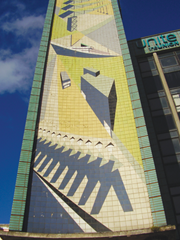Unison
 Describing itself as “Northern Ireland’s leading and liveliest trade union”, Unison was founded in July 1993. With 1.3 million members across the UK, it is Europe’s largest public sector union and was formed from the National Union of Public Employees, the Confederation of Health Service Employees, and the National and Local Government Officers Association; the latter did not organise locally.
Describing itself as “Northern Ireland’s leading and liveliest trade union”, Unison was founded in July 1993. With 1.3 million members across the UK, it is Europe’s largest public sector union and was formed from the National Union of Public Employees, the Confederation of Health Service Employees, and the National and Local Government Officers Association; the latter did not organise locally.
Unison does not organise in the Civil Service (NIPSA’s remit) but 90 per cent of members are drawn from the wider public sector, especially health and social services (68 per cent) and education (17 per cent).
Membership totalled 37,250 in December 2009, according to the Certification Officer’s annual report, but the union puts its current membership at 40,000. This includes new members since then and cross-border workers, who are often overlooked in statistics.
There are 30 branches. Collective bargaining is co-ordinated by ‘service groups’ in the larger sectors (health and social care, local government, education and higher education) and ‘sector groups’ in the smaller ones (housing, GP practices, youth justice, private nursing homes, community and voluntary).
Members can also join a self-organised group, which cover employees considered more vulnerable to discrimination. Forums for younger and retired members also exist.
The regional council meets annually and, in the meantime, the union’s work is overseen by the regional committee.
Unison’s main campaign is to secure a Programme for Government and Budget that delivers on the Good Friday Agreement, especially its emphasis on social and economic rights. Public services are seen as central but the union also wants to see more help for SMEs seeking contracts, an all-island economy and protection for cross- border workers’ rights.
As with Unite, Unison is affiliated to the UK Labour Party. Its general political fund supports Unison campaigns and members can also support Labour through the affiliated political fund.
The union is affiliated to the European Federation of Public Service Unions and Public Services International. It supports Amnesty International, the Stop the War Coalition and solidarity campaigns with the Palestinians, Burma, Venezuela and the Western Sahara.
Subscriptions from the province came to £2,261,900 in 2009, with UK-wide end- of-year funds standing at £89.5 million.
“In many parts of Northern Ireland, the only job available in a community is a public sector job,” Regional Secretary Patricia McKeown told agendaNi. “In many areas of disadvantage, the only jobs available are low-paid public sector jobs.”
The union recognises the private sector’s role in building infrastructure, R&D and supplying equipment. However, it insists that front-line services are best delivered by trained public servants who “go the extra mile”.
Privatised cleaning and catering services have “no place” and the union claims that standards have fallen under private contracts. Unison states that ‘cheaper is not better’ and opposes party policies which favour privatised services.
Voluntary sector services should be an “addition” to public services not a “substitution”.
McKeown sums up Unison as “a trade union which is a real agent of social change, both at home and on [an] international basis.”
As ICTU President in 2009, she stated that economically inactive people in Northern Ireland were “ignored by government and left to subsist at the margins of our society” and celebrated 50 years of the Cuban revolution. She stands by those views and says they also reflect the views of Unison’s membership.
General Secretary: Dave Prentis
Regional Secretary: Patricia McKeown
UK members (2009): 1,337,250
Northern Ireland 37,250*
members (2009) 40,000**
Website: www.unison.org.uk
* Certification Officer figures
** Unison figures





